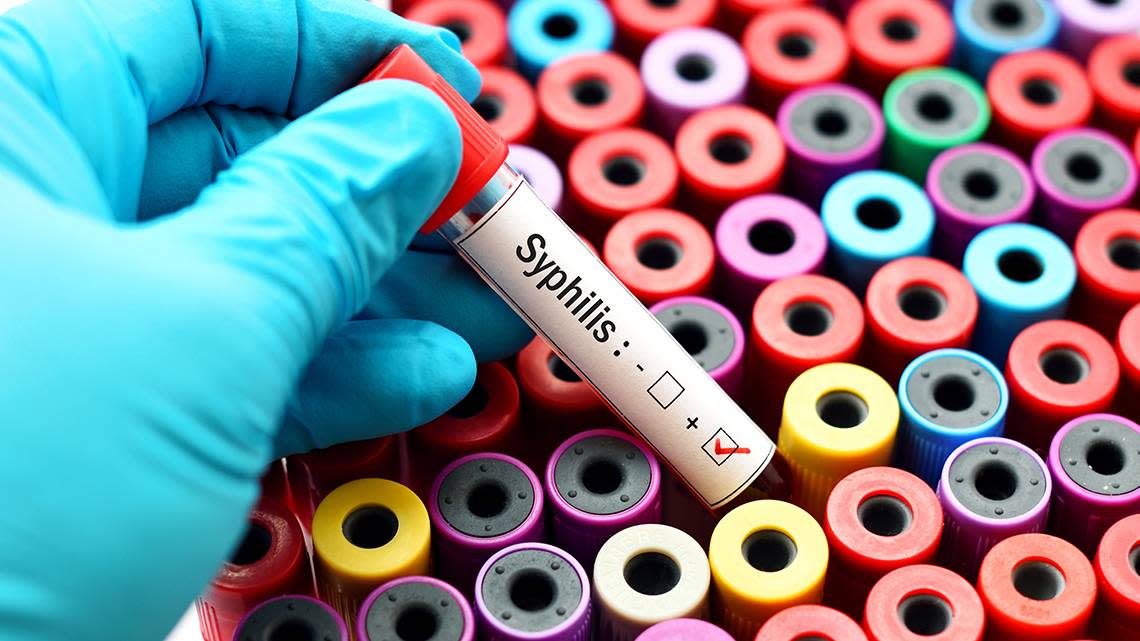Kansas City area doctors see increase in this STD. And the medicine is in short supply

Doctors in the Kansas City area are seeing an increase in syphilis, a dangerous sexually transmitted disease that has been growing more prevalent across Kansas and Missouri in recent years.
And the medicine used to treat it is now in short supply.
“We have, in general, seen more [syphilis] cases diagnosed or having to treat more cases than five years ago and we know that overall the number of cases per year has increased for the the past several years as well,” said Dr. Dana Hawkinson, medical director of infection prevention and control at the University of Kansas Health System.
Hawkinson said that local numbers for the uptick in cases were not available but the rise in cases follows a broader national trend.
In Kansas, the number of reported syphilis cases has gone up every year since 2020, when 529 cases were reported. In 2021, the number rose to 801 and then 941 in 2022. , according to the Kansas Department of Health and Environment.
Missouri has seen more syphilis cases as well. In 2022, the Missouri Department of Health and Senior Services reported a 259% increase in syphilis cases between 2015 and 2021.
The increase has been seen nationally as well, with the federal Centers for Disease Control reporting more than n 176,000 syphilis cases in 2021, up from 101,590 in 2017. The agency reported a 28% increase in cases between 2020 and 2021 alone.
What is syphilis?
Syphilis is a sexually transmitted infectious disease that’s caused by a bacteria called Treponema pallidum, according to Mayo Clinic.
After an initial infection, someone might find a single sore or multiple sores near where the infection entered the body. The sores are typically painless, firm and round and take about three to six weeks to heal, according to the CDC.
When left untreated the disease can lead to severe rashes on the body including on the hands and feet. If left untreated for 10 to 30 years, the disease can even damage internal organs like the heart and brain.
Anyone who is sexually active is at risk of contracting syphilis and should get tested regularly. Gay and bisexual men and people who are HIV positive have a higher chance of contracting the disease, according to the CDC.
Shortage of medicine
The increase in cases has caused a shortage in the penicillin used to treat the disease, Hawkinson said.
“We are seeing the numbers of syphilis cases increase all over the United States. It is increasing locally as well. But the “gold standard” drug to treat it is undergoing shortages,” Hawkinson said in a news conference in July.
Hawkinson told The Star that the University of Kansas Health System has adopted a plan to use alternative therapies for lower-risk populations that contract the disease.
The health system will prioritize the use of penicillin for at-risk populations like people who are HIV-positive or pregnant. At-risk populations will always receive penicillin, he said.
Hawkinson said he expects the penicillin shortage to last until 2024.
Why are we seeing an increase in cases?
The increase could be due to multiple factors, including a growing younger population, increased access to new and unfamiliar sexual partners through online dating platforms and a decrease in public health funding, Hawkinson said.
Kansas ranks 39th out of 50 states for public health funding. On average, the state spends $87 per resident on public health, according to the United Health Foundation America’s Health Ranking platform.
Missouri ranked 42nd.
Support for public health can increase education and outreach efforts and ensure people have a free or affordable place to get tested, Hawkinson said. He said a decrease in public health funding can also lead to a decrease in contact tracers, who are often responsible for making sure that people who have been in contact with the infection receive testing and treatment.
“It’s very important to keep that public health infrastructure so that those people have a place to go to get tested,” Hawkinson said.
How to prevent the spread of syphilis
To prevent the spread of syphilis people should practice safe sex by using condoms correctly every time. People should also get tested regularly for syphilis and other sexually transmitted infections, Hawkinson said.
People who test positive should make sure to get treated at a medical facility. Receiving adequate treatment will also reduce the spread of the disease.
Local and county health departments in Kansas often offer free or low-cost testing for sexually transmitted infections, according to Matthew Lara, a spokesperson for KDHE. .
Patients can also visit a federally qualified health center. To find a medical center near you, visit the KDHE website and enter your ZIP code into the search tool on the web page “Federally Qualified Health Centers.”

